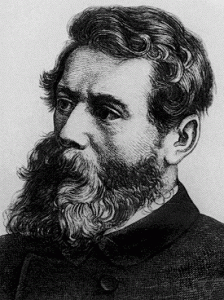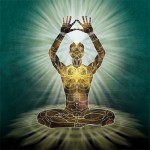Van Harvey's claim that Feuerbach's Essence of Religion[1] presents an important advance over The Essence of Christianity[2] rings true to me in several ways. To understand why, it is necessary to first briefly outline Feuerbach's argument in Christianity.
 Feuerbach begins Christianity by asserting that human beings alone have religion and that it is a result of self-consciousness which in turn is a product of species-consciousness (EC 1-2).
Feuerbach begins Christianity by asserting that human beings alone have religion and that it is a result of self-consciousness which in turn is a product of species-consciousness (EC 1-2).
One cannot, according to this view, be aware of oneself unless there is another of the same species with whom one can establish an I-Thou relationship (EC 2). He then asserts that self-consciousness is infinite, but only in the species (EC 6).
Individuals recognize their finitude only in consciousness of the infinitude of the species, which can be either an object of feeling or thinking (EC 7).
Feuerbach suggests that to feel the infinite is to perceive and affirm the infinitude of the power of feeling. Likewise, to think the infinite is to perceive and affirm the infinitude of the power of thought (EC 9). From this line of reasoning Feuerbach concludes that we must be divine: we can perceive the divine by feeling because feeling is divine (EC 9).
The content of the infinite is then drawn from the nature of humanity. Though we may conceive of higher beings, they are always characterized by qualities drawn from our own nature as projections of ourselves (EC 11).
 Feuerbach then claims that gods are "human nature purified, freed from the limits of [individuals]" (EC 14). Feuerbach's most famous quote perhaps is the summation of his argument: "Man—this is the mystery of religion—projects his being into objectivity, and then again makes himself an object to this projected image of himself thus converted into a subject" (EC 29-30).
Feuerbach then claims that gods are "human nature purified, freed from the limits of [individuals]" (EC 14). Feuerbach's most famous quote perhaps is the summation of his argument: "Man—this is the mystery of religion—projects his being into objectivity, and then again makes himself an object to this projected image of himself thus converted into a subject" (EC 29-30).
The Essence of Religion offers several advances over Feuerbach's earlier work: Perhaps the single greatest advance in Religion is the absence of any form of the Hegelian dialectic. While Feuerbach was praised in some quarters for his inversion of predicates and objects in the dialectic,[3] others raised objections, offering arguments that the two are not interchangeable as Feuerbach had proposed.
Further, over the course of time big ideas like the Hegelian dialectic have fallen out of favor, viewed as grandiose metanarratives that selectively choose cases to make the argument for history moving in an evolutionary direction towards an absolute consciousness.[4] Without the need for a culmination in the absolute, gone also is Feuerbach's claim in his early work that Christianity is the absolute religion (EC 145).
Next, Feuerbach is able to go back and focus on the role of human dependence on nature.[5] This new theory of religion is able to account for both the most primitive forms of magic and fetishism as well as more complex, anthropomorphic deities.
Freed from the mechanism of species consciousness and projection of human qualities onto the absolute, Religion feels much simpler, less technical, and more elegant.
On a final, personal note, as I read the Religion I find myself in greater agreement with Feuerbach's suggestions as he traces the history of religion arising from the feeling of dependence on nature.
Taken to its logical conclusion, it would appear that the less dependent humanity feels upon contingent circumstance and the more we know about how the world works, the less need we have for primitive deities whom we petition for favorable weather, good crops, and health.
![]() Gone also are gods who identify with tribes, ethnic nations, or modern political states and their agendas. In this way Feuerbach's theory aligns nicely with the developments we see even in ancient Israel as Yahweh moves from the avenging warrior or presence in theophanies of clouds, fire, and earthquakes to the sound of silence that Elijah hears when all natural phenomena have ceased.[6]
Gone also are gods who identify with tribes, ethnic nations, or modern political states and their agendas. In this way Feuerbach's theory aligns nicely with the developments we see even in ancient Israel as Yahweh moves from the avenging warrior or presence in theophanies of clouds, fire, and earthquakes to the sound of silence that Elijah hears when all natural phenomena have ceased.[6]
Gone are gods who require sacrifices of blood or burnt offerings. Instead Feuerbach's vision, in my estimation, is compatible with the idea of the author of Isaiah who, during the Babylonian captivity came to understand that God is more like no god at all than any of the other gods who had come before.[7]
Like Barth, I value the work Feuerbach does in clearing away various deities created by human hands and thoughts. And in the absence of Feuerbach's original claim that God is a projection of humanity, Barth's characterization of the "quite extraordinarily, almost nauseatingly, trivial"[8] conclusions of Feuerbach's earlier works can be revised.
Though Feuerbach's final response is still not perfect, conflating imagination and faith, it is a step in the right direction.
[1]Citations from The Essence of Religion refer to Ludwig Feuerbach and Alexander Loos, The Essence of Religion, Great books in philosophy (Amherst, N.Y.: Prometheus Books, 2004).
[2] Citations from The Essence of Christianity refer to Ludwig Feuerbach, The Essence of Christianity, The Library of religion and culture (New York: Harper, 1957).
[3] Karl Marx wrote "Feuerbach is the only person who has a serious and critical attitude to the Hegelian dialectic and who has made real discoveries in the field. He is the true conqueror of the old philosophy." See Karl Marx, Early writings [of] Karl Marx, The Pelican Marx library (Harmondsworth
London: Penguin; New Left Review, 1975). 381. as quoted in Van Austin Harvey, Feuerbach and the Interpretation of Religion, Cambridge studies in religion and critical thought 1 (Cambridge ; New York: Cambridge University Press, 1995).
[4] Troeltsch provides examples of this kind of argument.
[5] Nature being very broadly construed in Feuerbach's Lectures on the Essence of Religion as including "everything which man, notwithstanding the supernaturalist whisperings of theistic faith, experiences directly and sensuously as the ground and substance of his life. Nature is light, electricity, magnetism, air, water, fire, earth, animals, plants; nature is man, insofar as he is a being who acts instinctively and unconsciously." (as quoted in Harvey, Feuerbach and the Interpretation of Religion: 166.).
[6] 1 Kings 19:12, the "still small voice" translated as "the sound of thin hush," or "sound of silence" as translated in Richard Elliott Friedman, The Disappearance of God: A Divine Mystery, 1st ed. (Boston: Little, Brown and Co., 1995). 23.
[7] A phrase commonly used by James Alison in many presentations, see http://www.jamesalison.co.uk/texts/eng01.html.
[8] Feuerbach, The Essence of Christianity: xix-xx.
To what extent would you agree with Van Harvey’s claim that Feuerbach’s Essence of Religion represents an important advance over The Essence of Christianity?



